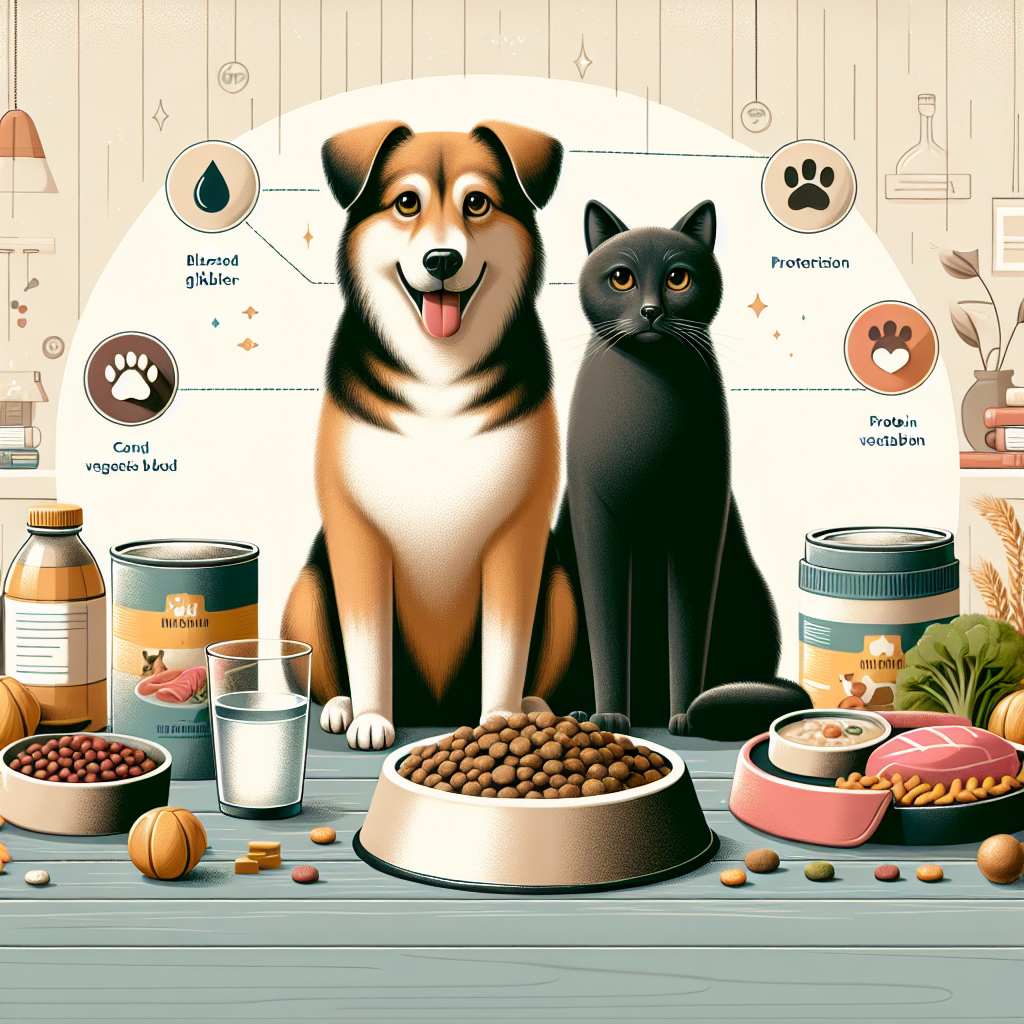
The Importance of a Balanced Diet for Your Pet’s Health
When it comes to our pets, we want nothing but the best for them. We shower them with love, take them on walks, and make sure they have a cozy bed to sleep in. But one aspect of pet care that often gets overlooked is their nutrition. Just like humans, pets need a balanced diet to stay healthy and thrive.
You might be thinking, “But my pet seems perfectly fine eating the same food every day.” While it’s true that some pets can tolerate a monotonous diet, it doesn’t mean that it’s the best option for their overall health. Just like us, pets need a variety of nutrients to support their bodily functions and maintain optimal health.
A balanced diet for pets consists of proteins, carbohydrates, fats, vitamins, and minerals. These nutrients work together to provide energy, support growth and development, and maintain a strong immune system. Without a proper balance of these nutrients, pets can suffer from a range of health issues, including obesity, allergies, and even organ failure.
Proteins are the building blocks of life, and they play a crucial role in your pet’s diet. They are responsible for building and repairing tissues, producing enzymes and hormones, and supporting a healthy immune system. Good sources of protein for pets include meat, fish, eggs, and dairy products. It’s important to choose high-quality protein sources to ensure that your pet is getting all the essential amino acids they need.
Carbohydrates are another important component of a balanced diet for pets. They provide energy and help regulate blood sugar levels. Good sources of carbohydrates for pets include grains, vegetables, and fruits. It’s important to choose complex carbohydrates that are rich in fiber and nutrients, rather than simple carbohydrates that can cause spikes in blood sugar levels.
Fats are often misunderstood and unfairly demonized, but they are an essential part of a pet’s diet. Fats provide energy, help absorb fat-soluble vitamins, and support healthy skin and coat. Good sources of fats for pets include fish oil, flaxseed oil, and animal fats. It’s important to choose healthy fats and avoid excessive amounts, as they can lead to weight gain and other health issues.
Vitamins and minerals are micronutrients that play a vital role in your pet’s overall health. They are involved in various bodily functions, including bone development, immune function, and cell growth. While most commercial pet foods are fortified with essential vitamins and minerals, it’s always a good idea to consult with your veterinarian to ensure that your pet is getting all the necessary nutrients.
In conclusion, a balanced diet is essential for your pet’s health and well-being. Just like us, pets need a variety of nutrients to support their bodily functions and maintain optimal health. By providing them with a balanced diet that includes proteins, carbohydrates, fats, vitamins, and minerals, you can ensure that your furry friend is getting all the nutrients they need to thrive. So, the next time you reach for that bag of pet food, take a moment to read the label and make sure it contains all the essential nutrients your pet needs. Your furry friend will thank you for it!
Understanding the Nutritional Needs of Different Pet Species
When it comes to our furry friends, we want to make sure they are happy and healthy. One important aspect of their well-being is their nutrition. Just like humans, pets have specific nutritional needs that must be met in order for them to thrive. However, it’s important to understand that different pet species have different nutritional requirements. In this section, we will explore the nutritional needs of various pets and how to ensure they are getting the right diet.
Let’s start with dogs. Dogs are omnivores, which means they can eat both meat and plant-based foods. However, their diet should primarily consist of high-quality animal protein. This is because dogs have a higher protein requirement compared to other animals. Additionally, they need a balance of fats and carbohydrates for energy. It’s important to choose a dog food that is specifically formulated for their breed, size, and age. Puppies, for example, have different nutritional needs compared to adult dogs. It’s also worth noting that certain breeds may have specific dietary requirements or sensitivities, so it’s always a good idea to consult with your veterinarian.
Cats, on the other hand, are obligate carnivores. This means that they require a diet that is primarily made up of animal protein. Cats have a higher protein requirement compared to dogs, and they also need certain essential amino acids that can only be found in animal-based proteins. It’s important to choose a cat food that is specifically formulated for their age and health condition. Kittens, for example, require a diet that is higher in calories and nutrients compared to adult cats. It’s also worth noting that cats are prone to urinary tract issues, so it’s important to choose a cat food that promotes urinary health.
Moving on to small mammals such as rabbits and guinea pigs, their diet should consist mainly of hay, fresh vegetables, and a small amount of pellets. Hay is an important part of their diet as it helps maintain their dental health and provides essential fiber. Fresh vegetables should be offered daily, and it’s important to avoid feeding them foods that are toxic to their species. Pellets should only be given in small amounts as they can be high in calories and lead to obesity.
Birds, such as parrots, have unique nutritional needs as well. Their diet should consist of a variety of fresh fruits, vegetables, seeds, and pellets. It’s important to provide them with a balanced diet that includes a mix of different foods to ensure they are getting all the necessary nutrients. It’s also important to avoid feeding them foods that are toxic to their species, such as avocado or chocolate.
In conclusion, understanding the nutritional needs of different pet species is crucial for their overall health and well-being. Dogs, cats, small mammals, and birds all have specific dietary requirements that must be met in order for them to thrive. By choosing the right pet food and providing a balanced diet, you can ensure that your furry friend is getting the nutrition they need to live a happy and healthy life. Remember to consult with your veterinarian for specific dietary recommendations based on your pet’s age, breed, and health condition.
Common Mistakes to Avoid When Feeding Your Pet
Feeding your pet is one of the most important responsibilities of being a pet owner. Just like humans, pets need a balanced diet to stay healthy and thrive. However, there are some common mistakes that pet owners often make when it comes to feeding their furry friends. In this article, we will discuss these mistakes and provide some tips on how to avoid them.
One common mistake that pet owners make is overfeeding their pets. It can be tempting to give your pet extra treats or larger portions of food, especially when they give you those adorable puppy dog eyes. However, overfeeding can lead to obesity and other health problems in pets. It’s important to follow the recommended portion sizes for your pet’s breed and size, and to resist the urge to give them too many treats.
Another mistake that pet owners often make is feeding their pets a poor quality diet. Just like humans, pets need a diet that is rich in nutrients and free from fillers and artificial ingredients. It’s important to read the labels on pet food and choose a brand that uses high-quality ingredients. Look for a pet food that lists a source of animal protein as the first ingredient, such as chicken or fish. Avoid pet foods that contain a lot of fillers, such as corn or wheat, as these provide little nutritional value for your pet.
Some pet owners also make the mistake of feeding their pets human food. While it can be tempting to share your dinner with your furry friend, many human foods can be toxic to pets. Foods like chocolate, onions, grapes, and avocados can be harmful or even fatal to pets. It’s best to stick to a diet that is specifically formulated for pets and to avoid giving them any human food, unless recommended by your veterinarian.
In addition to these mistakes, some pet owners also neglect to provide their pets with enough fresh water. Just like humans, pets need access to clean, fresh water at all times. Water is essential for digestion, circulation, and overall health. Make sure to regularly refill your pet’s water bowl and clean it to prevent bacteria from growing.
Lastly, some pet owners make the mistake of not adjusting their pet’s diet as they age. Just like humans, pets have different nutritional needs at different stages of life. Puppies and kittens need a diet that is higher in calories and nutrients to support their growth, while older pets may need a diet that is lower in calories to prevent weight gain. It’s important to consult with your veterinarian to determine the best diet for your pet based on their age, breed, and any specific health concerns they may have.
In conclusion, feeding your pet the right way is crucial for their overall health and well-being. Avoiding common mistakes such as overfeeding, feeding a poor quality diet, giving them human food, neglecting their water needs, and not adjusting their diet as they age can help ensure that your furry friend stays happy and healthy. Remember, your pet relies on you to provide them with the nutrition they need, so make sure to do your research and consult with your veterinarian to make the best choices for their diet.


Pingback: The Benefits of Adopting a Rescue Animal – Just another WordPress site
Pingback: The Benefits of Pets for Mental Health – Just another WordPress site